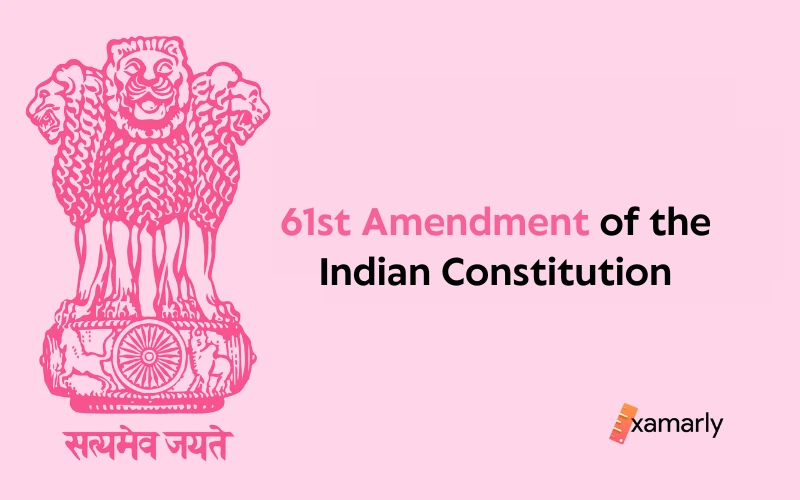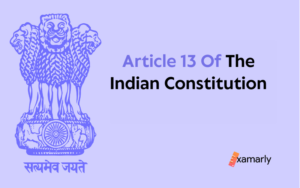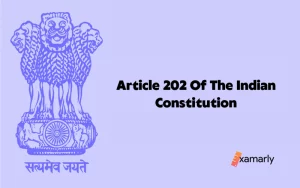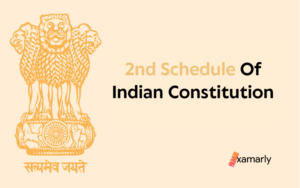One of the important amendments to the Indian Constitution, the 61st Amendment of the Indian Constitution, reduced the voting age for elections for Indian citizens from 21 years to 18 years. Having passed in 1988, this Amendment Act surely caused the revolution by involving the present-day youth in the political processes.
This blog will cover the important aspects of the 61st Constitutional Amendment along with the provisions and prominent facts.
Read on to speed up your UPSC exam preparation with this article related to Indian Polity.
Find the UPSC syllabus here.
61st Amendment of the Indian Constitution: Background
According to Article 326 of the Indian Constitution, the voting age for an Indian citizen was decided as 21 years on the basis of adult suffrage. In simple words, any person below the age of 21 was not allowed to cast a vote in the elections for the Lok Sabha and the Legislative Assembly of each State.
However, the then Prime Minister, Mr. Rajiv Gandhi was of the view that today’s youth is more capable of deciding the fate of Indian politics. They are comparatively more knowledgeable and informed and thus will prove to be a great asset to the country.
As a result, the 61st Amendment Bill was introduced in Parliament by Mr. B. Shankaranand, the then Water Resources Minister.
This Amendment lowered the legal voting age of citizens to 18 years from 21 years and thus a change in Article 326 was observed.
With the introduction of the 61st Amendment, a chance was given to unrepresented youths to express their views and emotions out in the open, thus inspiring them to participate in the political process.
Also Read: 60th Amendment of the Indian Constitution
Salient features and facts
The key features and facts associated with the Amendment are as follows:
- The Amendment is officially called the Constitution (Sixty-first Amendment) Act, 1988.
- The voting age in the Lok Sabha and the Legislative Assembly election was reduced to 18 years.
- The Act provided the underrepresented youth with an opportunity to come up with their knowledge and participate in democratic India.
- It amended Article 326. The term “eighteen years” shall be used in place of “twenty-one years.”
Date enacted
The Bill was passed in the Lok Sabha on 15th December 1988. It was approved after making a formal amendment to change the phrase “Sixty-second” in Clause 1 of the bill to “Sixty-first.”
In Rajya Sabha, it was passed on December 20, 1988. After getting approval from the States, the President gave his consent to the bill on March 28, 1989.
Statement of Objects and Reasons
The 61st Amendment of the Indian Constitution has proved to be one of the necessary amendments the country required at that time. The former Prime Minister wanted the youth to get involved in the democratic process in a democratic India.
Initially, Article 326 stated that no citizen below the age of 21 years could cast the vote for elections concerning Lok Sabha and Legislative Assembly of each state according to the concept of “adult suffrage”.
Also, the citizen must be free of any disqualification on the terms of corruption, non-residence, mental instability or unlawful activities.
The voting age for local government elections has been set at 18 by some State governments in our country, therefore, the age can be reduced for all elections.
The amendment of Article 326 paved the way for citizens below 18 years to keep their personal opinions and decide the minister accordingly keeping the conditions of disqualification the same.
Prominent people involved
The former Prime Minister, Mr. Rajiv Gandhi was the most important person that helped the unrepresented youth to come out of their cocoon and participate in the election activities.
Keeping his vision in mind, the bill introduced by Mr. B. Shankaranand in 1988 was considered in the Parliament and enacted in 1989.
Important provisions
Since the Amendment modified Article 326 which governs the Lok Sabha and Assembly elections, the provision related to the amended Article 326 is as follows:
- The phrase “eighteen years” shall be replaced in Article 326 of the Constitution. It shall be substituted by the phrase “twenty-one years.”
- It gave the present-day youth the freedom to cast their votes and allowed any citizen from the age of 18 onward, who otherwise qualifies may take part in India’s democratic procedures.
- As a result of this, the number of voters increased tremendously and encouraged young people to vote in the country’s elections.
Ratification
As required by Article 368(2), the Bill was approved by more than half of the State legislature, meaning it was ratified by a majority of the States and thus, the President’s consent was given to the bill and on March 28, 1989, it was enacted.
Five States did not approve of this bill. These were Jammu and Kashmir, Tripura, Nagaland, Tamil Nadu and Punjab.
You Might Also Like: 62nd Amendment of the Indian Constitution
Summing Up
Through this blog for UPSC preparation, you learnt that the 61st Amendment of the Indian constitution was introduced to lower the age of voting for Indian citizens to 18 years.
Before this Act, only natives of the age above 21 years were permitted to vote in the Lok Sabha and State Legislative Assemblies.
However, the disqualification criteria were not changed, and only the voting age was reduced.
This was necessary per the former Prime Minister as he considered the youth to be more educated and aware of politics than most adults. This way, he welcomed the underrepresented youth to enjoy a democratic India while also choosing the best leader for the country.
To get this Act implemented, Article 326 needed to be amended, and the approval of more than half of the States was required. Both the requirements were easily met, and the Act became a transforming factor for the youth to participate in the electoral process of the country.
FAQs
What is the 61st Amendment of the Indian Constitution all about?
The 61st Amendment revised the voting age to 18 years from 21 years. It was concerned with reducing the age limit of voting to the Lok Sabha as well as the State Legislative Assemblies.
When was it enacted?
It was passed in both Lok Sabha and Rajya Sabha in 1988 and, finally, was approved by the then President, Ramaswamy Venkatraman on March 28, 1989.
Which article got amended in the 61st Amendment of the Indian constitution?
Article 326 was modified, and in place of “twenty-one” years, the words “eighteen years” were introduced.
Which was the bill for the 61st Amendment of the Indian Constitution?
The Constitution (Sixty-second Amendment) Bill, 1988 (Bill No. 129 of 1988).
When was this bill introduced and by whom?
December 9, 1988, by B. Shankaranand (Minister of Water Resources).






